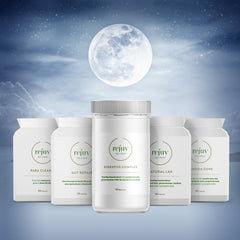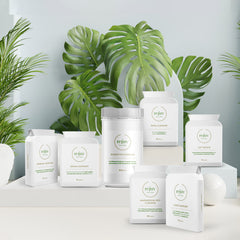Your gut and immune system are no longer separate domains in biology. They form an integrated ecosystem known as the gut–immune axis. Recent research indicates that the events occurring in the intestines have a profound impact on systemic immunity, inflammation, brain function, and disease susceptibility. (1)
"Your gut doesn't just digest food, it educates your immune system." In this blog, you'll get a clear, science-backed view of how the axis works, and the top 5 pillars you must address if you're serious about scaling your health.
If there's one system in the body that truly governs your long-term vitality, it's your gut. Science now confirms what naturopaths have long maintained: your gut and immune system are deeply intertwined, communicating through what's called the gut–immune axis. (2)
Understanding and supporting this relationship is one of the most potent ways to upgrade your health, energy, and resilience.
What Is the Gut–Immune Axis?
Around 70–80% of your immune cells live in your gut-associated lymphoid tissue (GALT). This isn't just a digestion zone — it's a massive immune training ground. (3) Your intestinal lining acts as a barrier between the outside world (everything you eat) and your internal environment, deciding what gets absorbed and what gets destroyed.
Within this ecosystem reside trillions of microbes — bacteria, fungi, and even viruses — collectively referred to as your microbiome. (4) These tiny residents communicate constantly with your immune system through metabolites like short-chain fatty acids (SCFAs), neurotransmitters, and cytokines. (5)
When your microbiome is balanced, inflammation stays low, your immune response is thoughtful and controlled, and your energy and mood flourish. (6) When it's imbalanced (dysbiosis), the gut wall weakens, inflammation rises, and your immune system starts firing at the wrong targets, setting the stage for fatigue, allergies, autoimmune issues, and even anxiety or depression. (7)
The Top 5 Things You Need to Know to Strengthen the Gut–Immune Axis
1. Feed Your Microbiome — It Feeds You Back
Think of your gut bacteria as your inner garden. They thrive on prebiotic fibres found in foods like:
- Chicory root [Cichorium intybus]
- Green bananas
- Jerusalem artichoke
- Flaxseeds
- Apples and baobab fruit
When your bacteria digest these fibres, they produce SCFAs, such as butyrate, acetate, and propionate, molecules that calm inflammation, strengthen your gut barrier, and regulate immune cells. (8)
Top Tip: Include 30+ plant foods a week, different colours and fibres feed different beneficial microbes.
2. Heal and Seal the Gut Lining
A strong intestinal barrier prevents pathogens from entering and allows nutrients to pass through. Chronic stress, alcohol, medications, or processed food can make the gut "leaky," allowing toxins to enter the bloodstream and over-stimulate the immune system. (9)
Key nutrients to restore the lining include:
- L-Glutamine – the primary fuel for intestinal cells(10)
- Zinc & Vitamin A – help repair epithelial tissue(11)
- Collagen or bone broth – provides glycine and proline(12)
- Slippery elm, aloe vera, marshmallow root – soothing herbs that protect mucous membranes(13)
Top Tip: When you feel run down, focus for 2–4 weeks on restorative foods and soothing herbs rather than aggressive detoxing.
3. Crowd Out the "Bad Guys" with Probiotics
Your microbiome thrives on diversity, but stress, antibiotics, and poor diet allow opportunistic microbes to dominate. Using targeted probiotics helps reseed beneficial species and rebalance the terrain. (14)
Look for strains such as:
- Lactobacillus plantarum (immune modulation)
- Bifidobacterium longum (anti-inflammatory)
- Bacillus coagulans (spore-forming, stable for travel)
- Saccharomyces boulardii (balances yeast and bacteria)
Top Tip: Pair probiotics with prebiotic fibre and fermented foods like sauerkraut, kefir, or miso for a synergistic effect.
4. Reduce inflammation from the Inside Out
A balanced immune system is not overactive, it's intelligent. The modern lifestyle (sugar, processed oils, stress, lack of sleep) drives silent inflammation that disrupts both gut flora and immune balance. (15)
Anti-inflammatory foods to focus on:
- Fatty fish or algae omega-3 (EPA/DHA)
- Turmeric (curcumin + black pepper)
- Green tea, rosemary, and ginger
- Colourful berries, especially blackcurrant and elderberry
- Dark leafy greens
Top Tip: Think "rainbow meals", where each colour pigment represents a different antioxidant family that helps cool inflammation and supports immune defence.
5. Manage Stress — Because Cortisol Rules Your Gut
Your nervous system and gut are in constant conversation through the vagus nerve. Chronic stress raises cortisol, reduces digestive enzyme output, slows gut motility, and alters your microbiome within days. (16)
Incorporate daily stress-modulating habits:
- Deep belly breathing or meditation (even 5 minutes)
- Adaptogenic herbs like ashwagandha, rhodiola, or holy basil
- Gentle exercise, stretching, or walking after meals
- Prioritising 7–8 hours of restorative sleep
Top Tip: If you often feel bloated or anxious, start with breathwork before meals, it activates your parasympathetic "rest and digest" system.
Putting It All Together
Your gut isn't just a digestive organ — it's the control centre of your immune system, hormones, and even mood. By nurturing your microbiome, protecting your intestinal barrier, and managing inflammation and stress, you can create a resilient internal ecosystem that supports total health and longevity. (17)
When you balance your gut, your immune system finally stops fighting you — and starts fighting for you.
My Top Takeaways
If you want to scale up your health in the next 6–12 months, start by focusing on:
- Whole, unprocessed foods and 30+ plant types weekly
- Regular probiotics and prebiotic fibres
- Gut-lining nutrients and anti-inflammatory herbs
- Daily stress-reduction rituals
- Consistent sleep and hydration
Small daily actions transform your gut ecology, and that's where true, lasting vitality begins.
Ready to take your health to the next level?
Complete our Wellness Profile for a full, personalised review of your gut, immune system, and overall wellbeing, and get expert guidance tailored just for you.
References
- Frontiers, PMC. https://pmc.ncbi.nlm.nih.gov/articles/PMC10482236
- Nutritional Immunology studies: An overview of the gut-immune axis.
- Gut-associated lymphoid tissue (GALT) immune cell localisation: Journal of Immunology, 2015.
- Human Microbiome Project Consortium, 2012.
- SCFA and immune modulation, Clinical Reviews in Allergy & Immunology, 2018.
- Microbiome balance and inflammation control, Nature Reviews Immunology, 2019.
- Dysbiosis and immune malfunction, Gut Microbes Journal, 2017.
- SCFAs and gut barrier function, Digestive Diseases and Sciences, 2020.
- Leaky gut syndrome and barrier integrity, World Journal of Gastroenterology, 2017.
- L-Glutamine Supplementation in gut repair, Current Opinion in Clinical Nutrition, 2016.
- Role of zinc and vitamin A in epithelial repair, Journal of Trace Elements in Medicine and Biology, 2018.
- Collagen peptides in gastrointestinal healing, Nutrients Journal, 2021.
- Herbal extracts and mucosal protection, Phytotherapy Research, 2019.
- Probiotics and gut diversity, microbiome, 2018.
- Lifestyle-driven inflammation, Frontiers in Immunology, 2021.
- Vagus nerve and gut-brain axis, Nature Communications, 2019.
- Gut health's systemic effects, Trends in Endocrinology and Metabolism, 2020.












